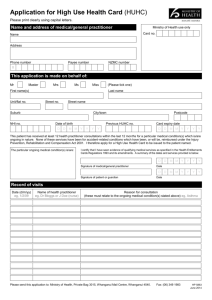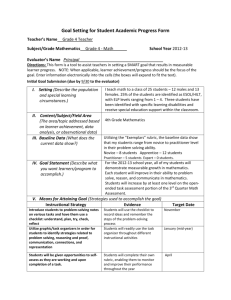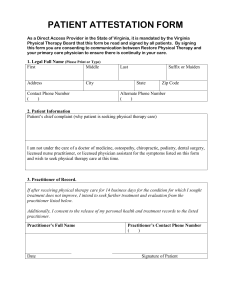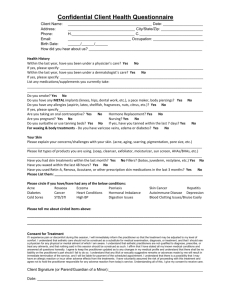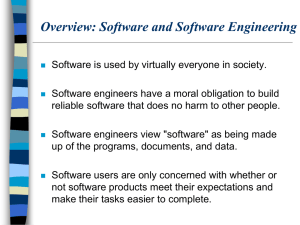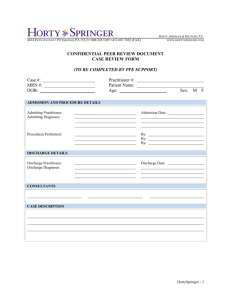School Psychology Internship Evaluation University of Wisconsin—Stout
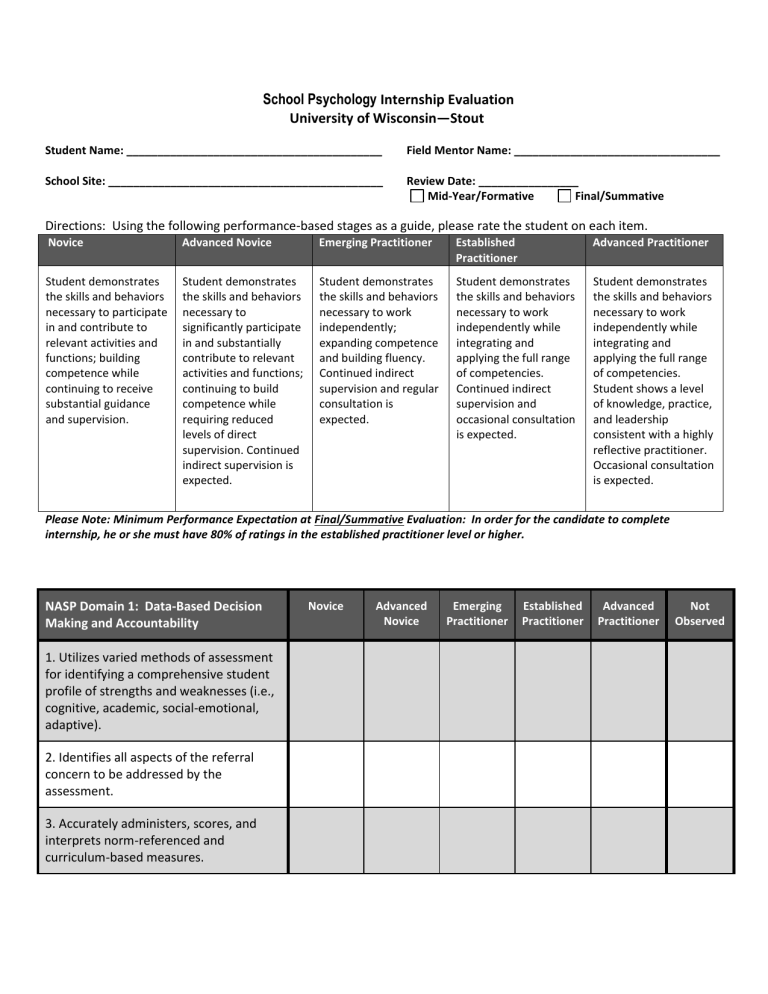
School Psychology
Internship Evaluation
University of Wisconsin—Stout
Student Name: _________________________________________ Field Mentor Name: _________________________________
School Site: ____________________________________________ Review Date: ________________
Mid-Year/Formative Final/Summative
Directions: Using the following performance-based stages as a guide, please rate the student on each item.
Novice Advanced Novice Emerging Practitioner Established
Practitioner
Advanced Practitioner
Student demonstrates the skills and behaviors necessary to participate in and contribute to relevant activities and functions; building competence while continuing to receive substantial guidance and supervision.
Student demonstrates the skills and behaviors necessary to significantly participate in and substantially contribute to relevant activities and functions; continuing to build competence while requiring reduced levels of direct supervision. Continued indirect supervision is expected.
Student demonstrates the skills and behaviors necessary to work independently; expanding competence and building fluency.
Continued indirect supervision and regular consultation is expected.
Student demonstrates the skills and behaviors necessary to work independently while integrating and applying the full range of competencies.
Continued indirect supervision and occasional consultation is expected.
Student demonstrates the skills and behaviors necessary to work independently while integrating and applying the full range of competencies.
Student shows a level of knowledge, practice, and leadership consistent with a highly reflective practitioner.
Occasional consultation is expected.
Please Note: Minimum Performance Expectation at Final/Summative Evaluation: In order for the candidate to complete internship, he or she must have 80% of ratings in the established practitioner level or higher.
NASP Domain 1: Data-Based Decision
Making and Accountability
Novice Advanced
Novice
Emerging
Practitioner
Established
Practitioner
Advanced
Practitioner
Not
Observed
1. Utilizes varied methods of assessment for identifying a comprehensive student profile of strengths and weaknesses (i.e., cognitive, academic, social-emotional, adaptive).
2. Identifies all aspects of the referral concern to be addressed by the assessment.
3. Accurately administers, scores, and interprets norm-referenced and curriculum-based measures.
4. Accurately conducts comprehensive functional behavioral assessments which lead to effective intervention plans.
5. Accurately collects and graphs data.
6. Completes reports that are precise, well-integrated, and understandable.
7. Uses data to measure outcomes of services as part of a comprehensive problem solving model.
NASP Domain 1 meets WI Department of Public Instruction Pupil Service Standards 3
NASP Domain 2: Consultation and
Collaboration
Novice Advanced
Novice
Emerging
Practitioner
Established
Practitioner
Advanced
Practitioner
Not
Observed
1. Applies psychological and educational principles to achieve positive outcomes for children (behavioral, problem-solving, mental health, organizational, instructional).
2. Effectively communicates and works collaboratively within a group/meeting setting (i.e., participates actively in and/or effectively leads group meetings.)
3. Facilitates a problem-solving process amongst parents and/or professionals for planning, implementing, and evaluating interventions.
NASP Domain 2 meets WI Department of Public Instruction Pupil Service Standard 5, 7
NASP Domain 3: Interventions and
Instructional Support to Develop
Academic Skills
Novice Advanced
Novice
Emerging
Practitioner
Established
Practitioner
Advanced
Practitioner
Not
Observed
1. Demonstrates knowledge of curriculum and instructional strategies that facilitate academic achievement (ex., teacherdirected instruction, literacy instruction, peer-tutoring, interventions for selfregulation and planning/organization, etc).
2. Develops appropriate academic goals for children with diverse abilities, disabilities, backgrounds, strengths, and needs.
3. Develops and implements (directly or via consultation) appropriate academic interventions that are linked to student needs.
4 . Evaluates effectiveness of academic interventions and makes appropriate changes based on empirical evidence.
NASP Domain 3 meets WI Department of Public Instruction Pupil Service Standards 2, 6
Novice NASP Domain 4: Interventions and
Mental Health Services to Develop Social
& Life Skills
Advanced
Novice
Emerging
Practitioner
Established
Practitioner
Advanced
Practitioner
Not
Observed
1. Demonstrates knowledge of strategies in social-emotional, behavioral, and mental health services (ex., counseling, behavioral intervention, social skills interventions, instruction for selfmonitoring, etc).
2. Develops appropriate social-emotional and adaptive goals for children with diverse abilities, disabilities, backgrounds, strengths and needs.
3. Develops and implements (directly or via consultation) appropriate social/emotional/behavioral interventions that are linked to student needs.
4 . Evaluates effectiveness of social/emotional/behavioral interventions and makes appropriate changes based on empirical evidence.
NASP Domain 4 meets WI Department of Public Instruction Pupil Service Standards 2, 6
NASP Domain 5: School-Wide Practices to Support Learning
Novice Advanced
Novice
Emerging
Practitioner
Established
Practitioner
Advanced
Practitioner
Not
Observed
1. Demonstrates knowledge of basic school systems and what transpires in diverse classrooms (general ed, special ed, alternative ed).
2. Understands the Wisconsin ten teacher standards.
3. Demonstrates knowledge of and/or participates in a multi-tiered continuum of school-based services (ex., RtI for academics, PBIS)
4. Participates in the development of evidence-based strategies for effective school-wide policies and practices (ex., discipline, instructional supports, staff training, program evaluation, grading, school improvement plans, transition planning).
NASP Domain 5 meets WI Department of Public Instruction Pupil Service Standards 1, 2, 5, 6
NASP Domain 6: Preventative and
Responsive Services
Novice Advanced
Novice
Emerging
Practitioner
Established
Practitioner
Advanced
Practitioner
Not
Observed
1. Demonstrates knowledge of principles and practices related to resiliency and risk factors in learning and mental health.
2. Demonstrates ability to seek out appropriate resources to assist with student and/or family needs (ex., resources for homeless families, access to community health or other services, abuse resources, etc).
3. Participates in the design, implementation, and evaluation of programs that address systematic problems (ex., school failure, truancy, dropout, bullying, school violence, youth suicide, etc)
NASP Domain 6 meets WI Department of Public Instruction Pupil Service Standards 2, 5, 6
NASP Domain 7: Family and School
Collaborations
Novice Advanced
Novice
Emerging
Practitioner
Established
Practitioner
Advanced
Practitioner
Not
Observed
1. Understands the characteristics of family, family strengths and needs, family culture, and family-school interaction that impacts learning.
2. Helps families to become active participants in their child’s education by promoting positive family-school interactions.
3. Identifies and navigates with sensitivity diverse cultural contexts and perspectives that impact family-school communication and collaboration.
4. Utilizes evidenced-based problemsolving strategies, consultation, evaluation methods, and direct/indirect services to enhance family-schoolcommunity effectiveness in addressing the needs of children.
NASP Domain 7 meets WI Department of Public Instruction Pupil Service Standards 4, 5, 7
NASP Domain 8: Diversity in
Development and Learning
Novice Advanced
Novice
Emerging
Practitioner
Established
Practitioner
Advanced
Practitioner
Not
Observed
1. Demonstrates knowledge of principles and practices related to diversity factors
(i.e., age, gender or gender identity, cognitive capabilities, social-emotional skills, developmental level, race, ethnicity, national origin, religion, sexual and gender orientation, disability, chronic illness, language, socioeconomic status).
2. Considers English proficiency when interacting with culturally and linguistically diverse students and making decisions about assessment and intervention.
3. Provides culturally competent practices in all areas of service.
NASP Domain 8 meets WI Department of Public Instruction Pupil Service Standards 4, 7
NASP Domain 9: Research and Program
Evaluation
Novice Advanced
Novice
Emerging
Practitioner
Established
Practitioner
Advanced
Practitioner
Not
Observed
1. Demonstrates knowledge of research design, measurement, and varied methods of data collection techniques used in educational settings.
2 . Consumes research material and seeks information when he/she needs to increase his/her knowledge base.
3. Participates in the design and analysis of program evaluation.
NASP Domain 9 meets WI Department of Public Instruction Pupil Service Standards 3
NASP Domain 10: Legal, Ethical, and
Professional Practice
Novice Advanced
Novice
Emerging
Practitioner
Established
Practitioner
Advanced
Practitioner
Not
Observed
1. Understands the comprehensive roles and functions of the school psychologist
(ex., foundations of school psychology; ethical, legal and professional standards related to professional identity; and effective practice as a school psychologist).
2. Understands and adheres to legislation and regulations relevant to education (i.e,
IDEA, 504, NCLB, FERPA, confidentiality, etc).
3. Seeks ongoing professional development opportunities (ex., state or national conferences, workshops, webinars, etc.)
4. Provides services consistent with ethical and professional standards in school psychology.
NASP Domain 10 meets WI Department of Public Instruction Pupil Service Standards 4
Professional Work Characteristics
1. Is appropriately/professionally dressed and well-groomed.
Rarely
2. Demonstrates reliability in work, attendance, and punctuality.
3. Is organized and demonstrates ability to plan ahead (e.g., preparing for assessments and meetings, having appropriate materials ready and available).
4. Takes initiative (i.e., commensurate with skills) without being asked.
5. Accepts supervision and incorporates constructive feedback openly and appropriately.
6. Is tactful and appropriate with teachers, families, and other service providers.
7. Clearly and concisely communicates to a diverse audience, both verbally and in written format.
Professional Work Characteristics meet WI Department of Public Instruction Pupil Service Standard 7
Often Always
Comments from Mentor
I have completed the above evaluation and reviewed it with the intern.
________________________________________________
Signature of Mentor
I have reviewed the above evaluation.
________________________________________________
Signature of Intern
I have reviewed the above evaluation.
________________________________________________
Signature of University Supervisor
After completed, the intern should upload to D2L.
______________
Date
_______________
Date
________________
Date
For Intern and University Use:
Intern: Please calculate the following prior to submitting to your university supervisor.
Total number of items rated at Established Practitioner level or higher = __________
Divided by


